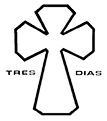Survey Helps Measure Community Health
We all know what a spiritually healthy community looks like. The vitality shows in the joyful fellowship of secuelas, in support from local churches, in the number of candidates for each weekend, in broken relationships healed, and in renewed commitments to serve the Lord.
But what do successful communities do to maintain their growth and vibrant spirituality? And how do they differ from those communities where the joy of the Tres Dias method has lost some of its luster?
In March of this year, Membership VP Beau Bruce launched a major survey effort with a two-fold purpose. First, to provide an instrument for helping community leaders make an honest assessment of their community’s health, and second, to identify what practices are most important for supporting health.
Some of the findings are not surprising. The healthy and growing communities have been far more successful in helping candidates find reunion groups, compared with their less-healthy counterparts. Moreover, these vibrant communities are more likely to offer formal sponsorship training and to have a program of outreach to pastors.
One of the most significant factors, however, is diversity. The healthier communities outdistance their counterparts by involving candidates, secretariat members, and team members from a diversity of denominations as well as a diversity of age demographics, especially Millennials.
This last point may be especially poignant. Tres Dias blossomed in America in the late 1970s and early 1980s. Many of those early leaders have retired or passed on, and once-successful secretariats have grayed as they watched the number of candidates dwindle. Millennials are now the largest age demographic in America, outnumbering the Baby-Boomers. Mistakenly labeled as lazy and selfish, the tech-savvy members of this group are relationship-hungry, spontaneous, and seeking experiences that give depth to life. They need to know about Tres Dias.
The questionnaire included two open-ended questions. The first encouraged the respondents to “boast in the Lord”–to tell about the special qualities or achievements in their community, giving credit to God for these accomplishments.
The second invited respondents to tell how the International Secretariat could help their community. The most frequent requests were for help with a community database and website design, more creative ways to teach the Essentials, and help with sponsorship training. Beau Bruce and others on the International Secretariat are planning ways to answer those needs and others.
Follow-up interviews will collect information from those communities that have been especially successful so as to pass their methods on to others.
For a copy of the questionnaire, for use in your own community’s health check-up, click this link.
For a statistical analysis of the results, click this link.
Previous Story
Contagious Love Leads to a New Community
Next Story
